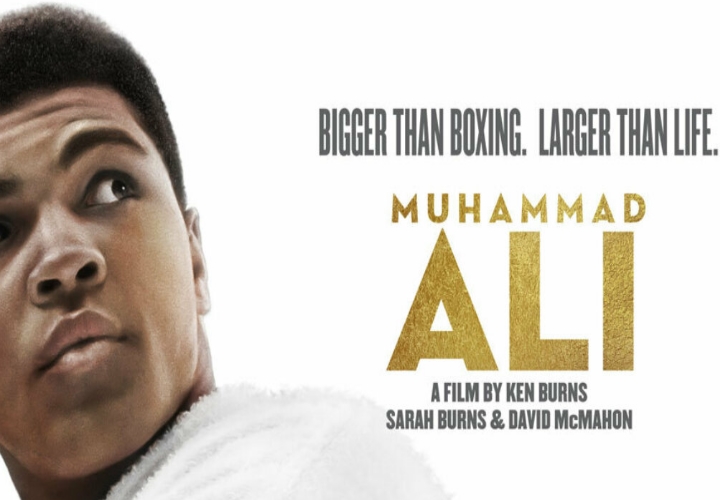Even now, five years after his unfortunate passing, Muhammad Ali might be the most recognizable athlete on the planet. Long ago rendered an icon of popular culture, the library of books, movies, and documentaries focused on Ali is vast. Ali can feel as exhaustively explored as any American not named Washington, Lincoln, or Kennedy.
The exploration gets a heavy new chapter in the coming days.
It started on Sunday, and continuing through Wednesday (8 PM EST), PBS will air “Muhammad Ali,” the latest addition to the library of The Greatest. It is, at the least, the most expansive walk through the career, life, and times of Ali since 1996’s “Muhammad Ali: The Whole Story.” One of the things that stood out about the full version of the 1996 piece was the use of extended fight footage, with nearly half of the six episodes devoted to extended pieces of Ali’s fights.
What stands out for this four-part documentary, clocking near eight hours of running time, is the director tackling the material.
With multiple Emmys and Academy Award nominations under his belt, filmmaker Ken Burns returns to the Sweet Science for the first time since 2005’s outstanding “Unforgivable Blackness: The Rise and Fall of Jack Johnson.” The pedigree Burns brings as a filmmaker in general is a hook all its own. “Jazz,” “Baseball,” and “The Civil War,” just to name a few, stand the test of time as essential to the scholarship of their subject matter.
Burns brings the same attention to detail to “Ali.” If this latest effort falls short of being as essential as some of Burns other works, it isn’t for lack of effort. How one views Burns’ take on Ali may well rest on how new the material feels. Part of the problem of tackling Ali as a subject is fighting the sea of works that has come before it.
How much is there left to say about the wins over Sonny Liston, the years in exile fighting the draft, the rivalry with Joe Frazier, the win over George Foreman, or the sad end against Larry Holmes?
The answer is not much.
Where Burns piece adds meaningfully to the Ali library is that Burns has the whole of a life to look at. “Muhammad Ali” is the second high profile series to air since the death of Ali in 2016, the other being HBO’s “What’s My Name,” an exceptional piece that used Ali’s own voice and words in a way that genuinely breathed new life into the material. The HBO piece took viewers to Ali’s legendary Olympic torch lighting in 1996 as a symbolic end.
Burns takes viewers from Ali’s origins to his last breaths in a more standard approach but with his own typically strong use of poignant photographs, film footage, and the comments of friends, the press who covered Ali, his family, academics, and historians. What will feel new to many are some of the corners of the story Burns has the time to develop.
There is deeper insight into the relationship between Ali, Elijah Muhammad and Muhammad’s son Herbert, Ali’s business manager for years, then is often the case in other Ali documentaries. Burns pays close attention to the relationship between Ali and Malcolm X in the first half of the series as well though how that compares with Netflix’s “Blood Brothers,” another new documentary centered on their relationship, is hard to say having not seen that piece as yet.
Some other elements that stood out were small things like more attention to how long it took to make the fight between Ali and Ernie Terrell. Most of the last half of the final episode digs into the post-fight life of Ali with greater detail than other pieces have, or could have had depending on when they were made.
Burns does well to find some rare clips of Ali in training and interviews and those are instantly compelling. The talking heads utilized throughout will feel familiar to many, with some like Robert Lipsyte and Jerry Izenberg having long been standards in the chronicling of Ali, but that isn’t a negative. It’s a comprehensive piece and that is where its value is likely to endure.
Over time, Burns four-part product will likely emerge as an essential baseline piece for someone who wants to learn about Ali from start to finish. For younger viewers who don’t know the story, or those who have never dug in and want to know more, it’s a chance to be introduced in a meaningful way in the coming days.
Does that make this the best Ali documentary?
Ultimately, that answer is probably no. The Academy Award winning “When We Were Kings,” and the ESPN 30 for 30 episode “Muhammad and Larry,” should remain far in the lead. They bookend perfectly together and capture Ali in a way nothing else does.
Burns though provides a service in filling in the blanks around those two masterpieces. It might not have a lot of new things to say about Ali, but it has the time to combine the details in a way that makes it as complete a telling of the life of Ali as there has ever been.
Cliff Rold is the Managing Editor of BoxingScene, a founding member of the Transnational Boxing Rankings Board, a member of the International Boxing Research Organization, and a member of the Boxing Writers Association of America.


ADD COMMENT VIEW COMMENTS (2)